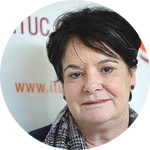As the ITUC Global Poll has shown, more than half the world believes their kids won’t find a decent job. More than three quarters think the current economic system favours the wealthy over ordinary people.
Wealth, and power, have become so imbalanced that governments are increasingly cowed by big business and big finance. The consequence for the rest of us is increasing inequality, joblessness and informality, even modern day slavery.
It puts workers at risks, families at risk, economies at risk. Our leaders not only fail to stand up for their own people but are afraid or unwilling to take necessary action in the face of increasingly climate destruction.
But there is hope – and that hope is in our collective ability to change this. It’s inspiring to see the movement for social justice building. On the streets, on campuses, in factories, online, people are coming together to demand a fairer world.
Recently the leaders of the global NGOs ActionAid, Greenpeace and Oxfam, the civil society alliance Civicus and the feminist network The Association for Women’s Rights in Development set out how securing a just and sustainable world means challenging the power of the one percent.
They committed to a vision that includes progressive taxes, universal free public health and education services, living wages, strengthening of workers’ bargaining power, and narrowing the gap between rich and poor.
And they pledged to work in a way that strengthens the power of the people to challenge the people with power – an approach that underpins the work of trade unions. It’s a vision we welcome, and we look forward to working ever more closely with them.
As the statement puts it: “A more inclusive society, at the service of human beings, is both essential and achievable. We will work together to stop the growing concentration of wealth and power in the hands of a few and to achieve redistributive policies to reverse inequality, and we will take on regressive corporate and elite interests who stand in the way and we will fight for the planet.”
This commitment to human dignity over corporate power is the consensus of people across the world.
People are demanding the governments curb the power of corporations. They want their governments to reduce the gap between rich and poor, ensure fair wages, and increase job security. They want their planet protected and their rights respected.
The end of slavery, votes for women, the end of Apartheid, drop the debt – all have shown that the powerful can be challenged, when we stand together. So have the victories of workers over the past century.
And so together we can also shift power back from the 1% to the 99%, and build a more inclusive society where all have work, and that works for all of us.
The different issues that have brought us into activism are all part of a common struggle for a world in which everyone matters.
We can’t win as individuals alone but we can through collective action. We won’t win on our own, but we will win working together. The good news is that the movement for social justice is building.









